139 books about Social classes and 7
start with I
139 books about Social classes and 7
139 books about Social classes
7 start with I start with I
7 start with I start with I

I
New & Selected Poems
Toi Derricotte
University of Pittsburgh Press, 2019
Winner, 2020 Frost Medal
Finalist, 2019 National Book Award
Honorable Mention, 2020 BCALA Literary Awards
Toi Derricotte’s story is a hero’s journey—a poet earning her way home, to her own commanding powers. “I”: New and Selected Poems shows the reader both the closeness of the enemy and the poet’s inherent courage, inventiveness, and joy. It is a record of one woman’s response to the repressive and fracturing forces around the subjects of race, class, color, gender, and sexuality. Each poem is an act of victory as the author finds her way through repressive forces to speak with beauty and truth.
This collection features more than thirty new poems as well as selections from five previous collections.
Finalist, 2019 National Book Award
Honorable Mention, 2020 BCALA Literary Awards
Toi Derricotte’s story is a hero’s journey—a poet earning her way home, to her own commanding powers. “I”: New and Selected Poems shows the reader both the closeness of the enemy and the poet’s inherent courage, inventiveness, and joy. It is a record of one woman’s response to the repressive and fracturing forces around the subjects of race, class, color, gender, and sexuality. Each poem is an act of victory as the author finds her way through repressive forces to speak with beauty and truth.
This collection features more than thirty new poems as well as selections from five previous collections.
[more]
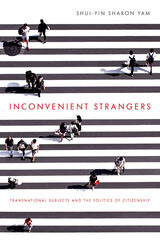
Inconvenient Strangers
Transnational Subjects and the Politics of Citizenship
Shui-yin Sharon Yam
The Ohio State University Press, 2019
Winner, 2021 CCCC Outstanding Book Award
Inconvenient Strangers: Transnational Subjects and the Politics of Citizenship draws attention to how intersecting networks of power—particularly race and ethnicity, gender, and social class—marginalize transnational subjects who find themselves outside a dominant citizenship that privileges familiarity and socioeconomic and racial superiority. In this study of how neoliberal ideas limit citizenship for marginalized populations in Hong Kong, Shui-yin Sharon Yam examines how three transnational groups—mainland Chinese maternal tourists, Southeast Asian migrant domestic workers, and South Asian permanent residents—engage with the existing citizenry and gain recognition through circulating personal narratives.
Coupling transnational feminist studies with research on emotions, Yam analyzes court cases, interviews, social media discourse, and the personal narratives of Hong Kong’s marginalized groups to develop the concept of deliberative empathy—critical empathy that prompts an audience to consider the structural sources of another’s suffering while deliberating one’s own complicity in it. Yam argues that storytelling and familial narratives can promote deliberative empathy among the audience as both a political and ethical response—carrying the affective power to jolt the dominant citizenry out of their usual xenophobic attitudes and ultimately prompt them to critically consider the human conditions they share with the marginalized and move them toward more ethical coalitions.
Inconvenient Strangers: Transnational Subjects and the Politics of Citizenship draws attention to how intersecting networks of power—particularly race and ethnicity, gender, and social class—marginalize transnational subjects who find themselves outside a dominant citizenship that privileges familiarity and socioeconomic and racial superiority. In this study of how neoliberal ideas limit citizenship for marginalized populations in Hong Kong, Shui-yin Sharon Yam examines how three transnational groups—mainland Chinese maternal tourists, Southeast Asian migrant domestic workers, and South Asian permanent residents—engage with the existing citizenry and gain recognition through circulating personal narratives.
Coupling transnational feminist studies with research on emotions, Yam analyzes court cases, interviews, social media discourse, and the personal narratives of Hong Kong’s marginalized groups to develop the concept of deliberative empathy—critical empathy that prompts an audience to consider the structural sources of another’s suffering while deliberating one’s own complicity in it. Yam argues that storytelling and familial narratives can promote deliberative empathy among the audience as both a political and ethical response—carrying the affective power to jolt the dominant citizenry out of their usual xenophobic attitudes and ultimately prompt them to critically consider the human conditions they share with the marginalized and move them toward more ethical coalitions.
[more]
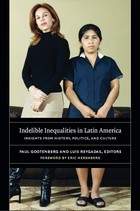
Indelible Inequalities in Latin America
Insights from History, Politics, and Culture
Paul Gootenberg and Luis Reygadas, eds.
Duke University Press, 2010
Since the earliest years of European colonialism, Latin America has been a region of seemingly intractable inequalities, marked by a stark divide between the haves and the have-nots. This collection illuminates the diverse processes that have combined to produce and reproduce inequalities in Latin America, as well as some of the implications of those processes for North Americans. Anthropologists, cultural critics, historians, and political scientists from North and South America offer new and varied perspectives, building on the sociologist Charles Tilly’s relational framework for understanding enduring inequalities. While one essay is a broad yet nuanced analysis of Latin American inequality and its persistence, another is a fine-grained ethnographic view of everyday life and aspirations among shantytown residents living on the outskirts of Lima. Other essays address topics such as the initial bifurcation of Peru’s healthcare system into one for urban workers and another for the rural poor, the asymmetrical distribution of political information in Brazil, and an evolving Cuban “aesthetics of inequality,” which incorporates hip-hop and other transnational cultural currents. Exploring the dilemmas of Latin American inequalities as they are playing out in the United States, a contributor looks at new immigrant Mexican farmworkers in upstate New York to show how undocumented workers become a vulnerable rural underclass. Taken together, the essays extend social inequality critiques in important new directions.
Contributors
Jeanine Anderson
Javier Auyero
Odette Casamayor
Christina Ewig
Paul Gootenberg
Margaret Gray
Eric Hershberg
Lucio Renno
Luis Reygadas
[more]
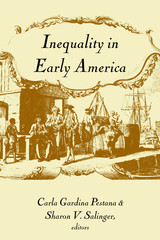
Inequality in Early America
Carla Gardina Pestana
Dartmouth College Press, 2015
This book was designed as a collaborative effort to satisfy a long-felt need to pull together many important but separate inquiries into the nature and impact of inequality in colonial and revolutionary America. It also honors the scholarship of Gary Nash, who has contributed much of the leading work in this field. The 15 contributors, who constitute a Who's Who of those who have made important discoveries and reinterpretations of this issue, include Mary Beth Norton on women's legal inequality in early America; Neal Salisbury on Puritan missionaries and Native Americans; Laurel Thatcher Ulrich on elite and poor women's work in early Boston; Peter Wood and Philip Morgan on early American slavery; as well as Gary Nash himself writing on Indian/white history. This book is a vital contribution to American self-understanding and to historical analysis.
[more]
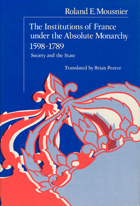
The Institutions of France under the Absolute Monarchy, 1598-1789, Volume 1
Society and the State
Roland Mousnier
University of Chicago Press, 1979
Political and administrative institutions cannot be understood unless one knows who is operating them and for whose benefit they function. In the first volume of this history, Mousnier analyzes such institutions in light of the prevailing social, economic, and ideological structures and shows how they shaped life in 17th- and 18th-century France. He traces the changing role of monarchical government, showing how it emerged over two centuries and why it failed.
In a society divided by hierarchical social groups, conflicts among lineages, communities, and districts became inevitable. Aristocratic disdain, ancestral attachment to privileges, and autonomous powers looked upon as rights, made civil unrest, dislocation, and anarchy endemic. Mousnier examines this contention between classes as they faced each other across the institutional barriers of education, religion, economic resources, technology, means of defense and communication, and territorial and family ties. He shows why a monarchical state was necessary to preserve order within this fragmented society.
Though it was intent on ensuring the survival of French society and the public good, the Absolute Monarchy was unable to maintain security, equilibrium, and cooperation among rival social groups. Discussing the feeble technology at its disposal and its weak means of governing, Mousnier points to the causes that brought the state to the limits of its resources. His comprehensive analysis will greatly interest students of the ancien régime and comparativists in political science and sociology as well.
In a society divided by hierarchical social groups, conflicts among lineages, communities, and districts became inevitable. Aristocratic disdain, ancestral attachment to privileges, and autonomous powers looked upon as rights, made civil unrest, dislocation, and anarchy endemic. Mousnier examines this contention between classes as they faced each other across the institutional barriers of education, religion, economic resources, technology, means of defense and communication, and territorial and family ties. He shows why a monarchical state was necessary to preserve order within this fragmented society.
Though it was intent on ensuring the survival of French society and the public good, the Absolute Monarchy was unable to maintain security, equilibrium, and cooperation among rival social groups. Discussing the feeble technology at its disposal and its weak means of governing, Mousnier points to the causes that brought the state to the limits of its resources. His comprehensive analysis will greatly interest students of the ancien régime and comparativists in political science and sociology as well.
[more]

The Institutions of France under the Absolute Monarchy, 1598-1789, Volume 2
The Origins of State and Society
Roland Mousnier
University of Chicago Press, 1984
Mousnier continues his massive and masterly history of France's transition from the Old Regime to the New. Mousnier's subject is the organization of the state, from the Council at the summit to the most humble clerks, guards, and attendants. He traces the gradual transformation of France from a judiciary state to a financial and executive bureaucracy, from a state and society based on hereditary statuses to one based on talents, personal capacities, and achievements, from the might of the sword to the power of the pen.
[more]
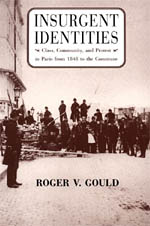
Insurgent Identities
Class, Community, and Protest in Paris from 1848 to the Commune
Roger V. Gould
University of Chicago Press, 1995
In this important contribution both to the study of social protest and to French social history, Roger Gould breaks with previous accounts that portray the Paris Commune of 1871 as a continuation of the class struggles of the 1848 Revolution. Focusing on the collective identities framing conflict during these two upheavals and in the intervening period, Gould reveals that while class played a pivotal role in 1848, it was neighborhood solidarity that was the decisive organizing force in 1871.
The difference was due to Baron Haussmann's massive urban renovation projects between 1852 and 1868, which dispersed workers from Paris's center to newly annexed districts on the outskirts of the city. In these areas, residence rather than occupation structured social relations. Drawing on evidence from trail documents, marriage records, reports of police spies, and the popular press, Gould demonstrates that this fundamental rearrangement in the patterns of social life made possible a neighborhood insurgent movement; whereas the insurgents of 1848 fought and died in defense of their status as workers, those in 1871 did so as members of a besieged urban community.
A valuable resource for historians and scholars of social movements, this work shows that collective identities vary with political circumstances but are nevertheless constrained by social networks. Gould extends this argument to make sense of other protest movements and to offer predictions about the dimensions of future social conflict.
The difference was due to Baron Haussmann's massive urban renovation projects between 1852 and 1868, which dispersed workers from Paris's center to newly annexed districts on the outskirts of the city. In these areas, residence rather than occupation structured social relations. Drawing on evidence from trail documents, marriage records, reports of police spies, and the popular press, Gould demonstrates that this fundamental rearrangement in the patterns of social life made possible a neighborhood insurgent movement; whereas the insurgents of 1848 fought and died in defense of their status as workers, those in 1871 did so as members of a besieged urban community.
A valuable resource for historians and scholars of social movements, this work shows that collective identities vary with political circumstances but are nevertheless constrained by social networks. Gould extends this argument to make sense of other protest movements and to offer predictions about the dimensions of future social conflict.
[more]
READERS
Browse our collection.
PUBLISHERS
See BiblioVault's publisher services.
STUDENT SERVICES
Files for college accessibility offices.
UChicago Accessibility Resources
home | accessibility | search | about | contact us
BiblioVault ® 2001 - 2024
The University of Chicago Press









